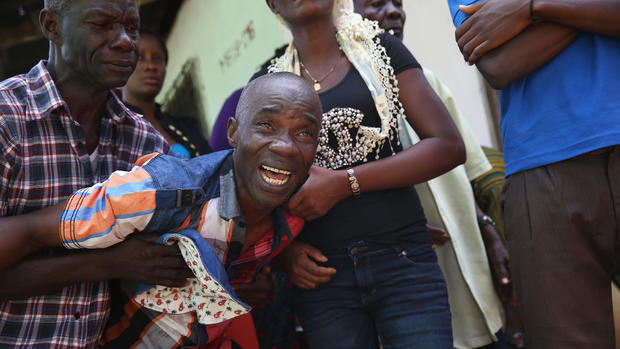Doc finds bravery, hope on Ebola frontline
MONROVIA, Liberia -- Locals' skepticism of Ebola and its treatment are only helping the virus spread in West Africa, where there are almost 8,400 cases of the deadly virus. It has killed more than 4,000 people so far.
Debora Patta says doctors in Liberia -- at the epicenter of the outbreak -- are working to reverse that perception.
In the nation's capital, however, the shock and denial are slowing wearing off as communities get directly involved in the fight against Ebola. Patta says one of the most crucial things to halt the spread of the disease is extracting those who are infected and getting them to treatment centers as quickly as possible.
- Texas nurse had daily contact with Ebola patient
- Ebola kills U.N. medical worker in Germany
- American man recovering from Ebola speaks out
Patta was there as extraction workers were called out to the sprawling Monrovia slum of West Point, where a rash of Ebola deaths over the summer led to a brief quarantine of the entire area.
Walking through the warren of narrow alleys, the extraction team performs one of the most dangerous jobs in the battle against the Ebola virus.
As a man showing symptoms of the disease is placed in the ambulance, anxious eyes all around take notice. He is then taken to the Doctors Without Borders Ebola treatment center known as ELWA3.
The center has a 250-bed capacity and is run under strict rules of hygiene and protection.
Many of the staff working here are Liberians who offer their services in a bid to rid their country of this terrible virus.
"The training never ends," Dr. Dan Lucey, one of the world's top virologists, told Patta. "It really shouldn't. There needs to be ongoing training. You need to always be hyper-vigilant."
Lucey used to work at Georgetown University in Washington D.C. -- a far cry from the makeshift doctors without borders treatment unit to which he has volunteered his time and skills. He can't praise his Liberian colleagues enough.
"It's incredible bravery and they are also helping to protect me," he told Patta. "Everyone has to trust everyone else."
Amidst the horror there are slivers of hope, like two survivors Patta watched press a paint-covered hand onto a wall: a symbol to mark their incredible recovery. Lucey told CBS News about a family of three that he treated, who all ended up walking out of the clinic Ebola-free.
At first, he thought the three year old child wouldn't make it.
"Fortunately, her mom and dad were here but they were also both quite sick," he recalled, "but they recovered quite adequately and took turns, mom and dad took turns, helping the three-year-old daughter, and now today it is one of the best days of my life, because they survived." He grew emotional as he recalled the case.
Teams of psychologists are on hand to help even the doctors deal with grief and trauma. But more importantly, they are also there to counsel people infected with Ebola, who often die alone. And then for those lucky enough to survive -- the teams assist with their re-integration into communities where they are sometimes ostracized because of the stigma of the disease.
